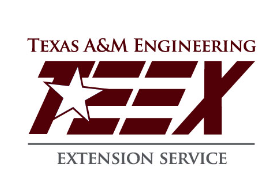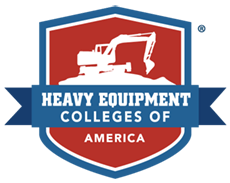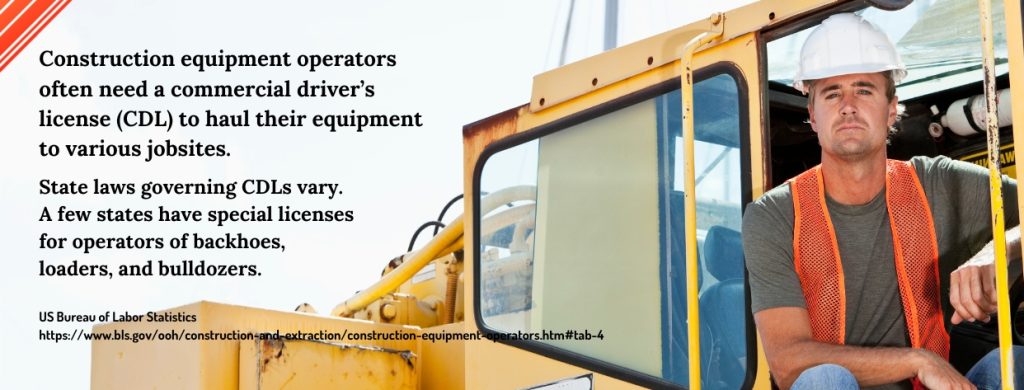There are plenty of options for those seeking entry-level trade careers that don’t require an Associate degree or higher. Along with electricians, welders, auto mechanics and landscapers, you should consider the heavy equipment operator career, especially if you have mechanical aptitude, physical stamina, spatial awareness, adaptability, problem-solving skills and a commitment to safety in construction or worksite settings.
What is a Heavy Equipment Operator?
A heavy equipment operator is a skilled professional who operates and controls heavy machinery and equipment used in construction, mining, agriculture and various industrial settings.
These machineries are the following:
- Earth-moving equipment like bulldozers, excavators and backhoes;
- Material handling equipment like loaders, forklifts and telehandlers;
- Construction equipment like graders, rollers and pavers;
- Mobile and tower cranes;
- Mining equipment like haul trucks, draglines, shovels and loaders;
- Agricultural equipment like combine harvesters and tractors;
- Forestry equipment like skidders, log loaders and feller bunchers; and
- Specialized equipment like compactors, trenchers and pile drivers.
Methodology
There are several trade schools, including Universities and Colleges, offering heavy equipment operator trade programs, typically at Diploma or Certificate levels. If you’re searching for online trade schools, look no further! We have a list of online trade schools and related institutions offering the best Heavy Equipment Operator technical training programs in the country.
Take note, though, that since online programs for this vocational training are rare, even for hybrid programs, we included three traditional programs that offer on-site or on-campus training.
The programs in our list, sorted randomly, are meticulously chosen based on certain criteria, including the following:
- Offers rigorous coursework covering essential topics in heavy equipment operation, including the use of various types of machinery as well as the awareness and practice of worksite safety standards,
- Employs expert instructors with extensive real-world experience in the field of heavy equipment operation and related industries,
- Provides opportunities for practical experience through field training, simulations, internships/apprenticeships,
- Has a curriculum designed for students to specialize in specific areas of heavy equipment operation such as crane operation, bulldozer operation or excavator operation,
- Helps connect students with professionals and organizations in the heavy equipment industry,
- Has programmatic and institutional accreditation from accrediting organizations or agencies recognized by the industry to ensure high-quality educational standards are maintained.
5 Top Online Heavy Equipment Operator Trade Schools
Texas A&M Engineering

Location: College Station, Texas
Online Delivery Method: Hybrid
Time It Takes to Complete: undisclosed
Completion Rate: undisclosed
Types of Aid: Veterans Benefits, Student Third-Party Loans
Texas A&M Engineering (TEEX) Extension Service offers a Heavy Equipment training program that equips students with both fundamental and advanced skills required to safely operate a diverse range of heavy machinery across various work environments.
The curriculum consists of a mix of fully online, instructor-led online and face-to-face courses that cover various types of heavy equipment like backhoes, excavations, cranes, forklifts and loaders.
This trade program also trains students on work zone safety, confined space entry and excavation safety. Many of these courses are crafted based on OSHA or Occupational Safety & Health Administration guidelines. Some of the safety courses have received the TCEQ – Texas Commission on Environmental Quality approval for satisfying credit hour requirements in specific operator license categories.
In addition to classroom training, students will also have hands-on experience and field exercises under this program.
Germanna Community College

Location: Locust Grove, Virginia
Online Delivery Method: Hybrid
Time It Takes to Complete: Less than one year
Completion Rate: undisclosed
Types of Aid: FAFSA, Grants, Federal Work Study, Loans, Virginia Alternative State Aid (VASA)
Students who are looking for trade careers in Virginia can consider the Heavy Equipment Operator Credential offered by Germanna Community College. This vocational training program provides hands-on practice and classroom learning delivered in a hybrid learning format that combines live classroom and online training for core craft skills courses.
Hands-on laboratory sessions for heavy equipment operator courses are also done with simulators that replicate real-life work scenarios.
This vocational and technical training program provides students with skills that are in high demand, including utility tractors and earth-moving equipment operation and safety. Students graduate from this program as credentialed heavy equipment operators.
The institutional accreditation of Germanna Community College to award Certificates and Associate Degrees has received approval from the SACSCOC-Southern Association of Colleges & Schools Commission on Colleges.
Heavy Equipment Colleges of America

Location: California, Georgia and Oklahoma. Washington for Veterans only
Delivery Method: On-site
Time It Takes to Complete: 3 Weeks
Completion Rate: undisclosed
Types of Aid: Veteran Benefits, State and Federal Grants
Heavy Equipment Colleges of America (HEC) offers various trade job certificates through its Heavy Equipment Training programs that take less than three weeks of on-site training. Two of these vocational training certificate programs include the following:
- Certificate of Heavy Equipment Operations – Level I is designed to equip trade career aspirants with a solid foundation in understanding, operating and maintaining heavy equipment to enter the industry as a novice. Students will develop skills in loading, digging and trenching, among other earth-moving skills, as well as the basics of operating safety, construction site fundamentals and preventative maintenance.
- Certificate of Heavy Equipment Operations – Level II builds upon the basic education obtained in the Level I certificate and provides students with more advanced knowledge and skills in heavy equipment operation and maintenance. This program also levels up the student’s capabilities so that they can take more complex and in-depth roles in the industry.
Both of these Heavy Equipment Operations Certificate programs provide students with hands-on, experiential training that allows them to practice on real heavy equipment so that they will become proficient in complex operations and gain a deep familiarity with these machines.
The two Certificate training programs are also designed to qualify students to sit for the certification exam for the Adaptable Equipment Proficiency Testing (ADEPT), a heavy equipment operations certification recognized by employers across the country.
The HEC trade school also offers heavy equipment certification programs for specific crane units. These are the following:
- Certificate of Heavy Equipment Operations, specializing in Mobile Crane
- Certificate in Heavy Equipment Operations, specializing in Tower Crane
- Certificate of Fixed Cab Crane Operation With Rigging and Signaling
- Certificate of Heavy Equipment Operations – Lattice Boom Crawler Crane (requires Mobile Crane Certification)
These crane training programs meet the educational and industrial standards set by the National Commission for the Certification of Crane Operators or NCCCO.
ACCSC or Accrediting Commission of Career Schools & Colleges has approved Heavy Equipment Colleges of America.
Midlands Technical College

Location: Columbia, South Carolina
Delivery Method: On-site
Time It Takes to Complete: 240 hours
Completion Rate: undisclosed
Types of Aid: Scholarships, Military Assistance, Workforce Innovation and Opportunity Act (WIOA), Segal AmeriCorps Education Award, Student Loans, Company Benefits
Midlands Technical College (MTC) offers a Heavy Equipment Operator – Comprehensive Training Certificate as one of its trade programs. This training focuses on four of the most commonly used heavy equipment in many construction projects, i.e., Excavators, Backhoe Loaders, Motor Graders and Dozers.
This vocational training program requires a total of 240 class hours for students to receive the Certificate and provides a total of 24 Continuing Education Units to those who complete the courses.
Students under this program will have hands-on learning experiences using the institution’s state-of-the-art Caterpillar simulators to have a first-hand understanding of the capabilities and limitations of each type of heavy equipment.
With a comprehensive understanding of various types of construction equipment, students can immediately enter the workforce after completing the program, whether in construction, utility or local/state government.
The program is sponsored by Truist and Truist Foundation, a purpose-driven financial services company dedicated to building and inspiring communities.
MTC upholds an approved institutional accreditation status from SACSCOC.
Utah State University

Location: Bland and Price, Utah
Delivery Method: On-site
Time It Takes to Complete: 16 credits
Completion Rate: undisclosed
Types of Aid: FAFSA, Private Education Loans, Scholarships
Those who are looking for trade schools with high-quality technical training can consider the Heavy Equipment Operator Certificate of Proficiency program offered by Utah State University in its Bland and USU Eastern Price campuses.
This vocational training program aims to provide students with the right skills to perform heavy equipment operator tasks by focusing on hands-on training through innovative simulators with relevant classes.
The curriculum requires students to complete a total of 16 credits to obtain the Certificate of Proficiency. The courses under this training program are:
- General Maintenance
- Dozer Operation
- Forklift Operation
- Front End Loader Operation
- Hydraulic Excavator Operation
- Motor Grader Operation
- Tractor Loader Backhoe Operation
Graduates of this certificate program will have mastery of multiple equipment types and work scenarios.
This training is an open-entry/open-exit program that allows students great flexibility in completing the courses at their own pace.
Utah State University holds an institutional accreditation approved by the NWCCU – Northwestern Commission on Colleges and Universities.
Heavy Equipment Operator Roles and Responsibilities
Heavy equipment operators are indispensable in the industry! Here are some of their roles:
- Safely maneuvering and operating the equipment to perform the required tasks like excavation, grading, material handling and construction
- Conducting pre-operational checks to ensure equipment is in good working condition
- Ensuring the efficient operation of the machinery to maximize productivity and minimize downtime
- Adhering to safety protocols, guidelines and industry standards to prevent accidents and injuries
- Working as part of a team to complete projects ranging from building structures to infrastructure development
- Keeping records of equipment usage, maintenance and daily operational logs
- Staying updated on equipment technology and industry advancements through training and certification programs
Heavy Equipment Operator Job Outlook
According to the country’s Labor Statistics Bureau, the employment demand for Construction Equipment Operators remains stable in the next ten years, with employment growth expected at 3%, which is as fast as the average for all workers. Moreover, the median wage for construction equipment operators as of May 2022 was $51,050 per year or $24.54 per hour, which is higher than the $46,310 median annual wage for all occupations.
Similarly, the job outlook for Material Moving Machine Operators is stable at 4% for the 2022-2032 period, and the median annual pay as of May 2022 was at $41,730.
For the Heavy and Tractor-trailer Truck Drivers, the job outlook for the same period is also stable at 4%, and the median annual pay as of May 2022 was at $49,920.
Heavy Equipment Operator Industry Statistics
According to the BLS website, the top three States with the highest employment level in Construction Equipment Operators as of May 2022 are:
- Texas – 40,490
- California – 31,940
- Florida – 27,730
These State rankings are the same for Crane or Tower Operators and Heavy and Tractor-Trailer Truck Drivers.

Frequently Asked Questions about Online Heavy Equipment Operator Trade Schools
Can students complete a Heavy Equipment Operator program fully online, and will it be as effective as in-person training?
Yes, you can. Take note, though, that online training programs for heavy equipment operators are typically offered in a hybrid learning format. While online programs are convenient and flexible, they may not fully replace the hands-on experience gained through in-person training.
Hybrid programs combine online coursework with practical, on-site training in order to provide a balanced approach.
It’s important to choose a program accredited by industry organizations and verify that it meets licensing requirements in your state. Employers often value both online and practical training, as it demonstrates adaptability and comprehensive skill development.
How long does it take to complete an online Heavy Equipment Operator program?
The duration of an online Heavy Equipment Operator program varies but typically ranges from a few months to a year. The length depends on factors such as program structure, your chosen specialization and whether you’re pursuing a certificate or a degree.
Keep in mind that some programs allow self-paced learning, which allows you to complete coursework faster if you have the time and dedication.
Do I need prior experience or qualifications to enroll in an online Heavy Equipment Operator program?
Not necessarily. Most online Heavy Equipment Operator training programs do not require previous experience or qualifications to enroll. They are designed to accommodate both beginners and individuals with some background in the field.
However, having a strong work ethic, mechanical aptitude, and a commitment to safety is highly beneficial. Some programs may offer introductory courses for those entirely new to the field.
For more valuable information, see the following:

